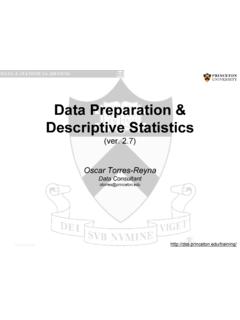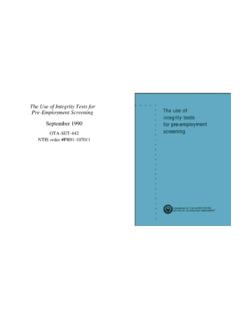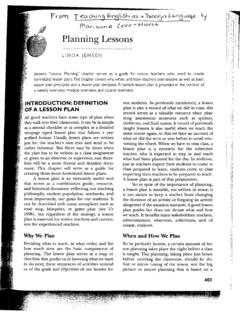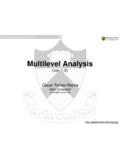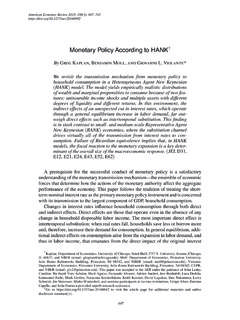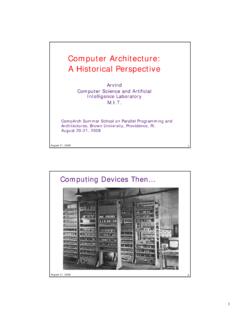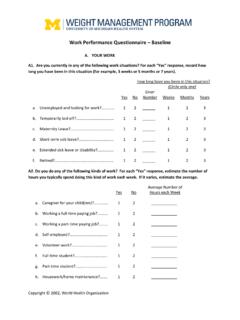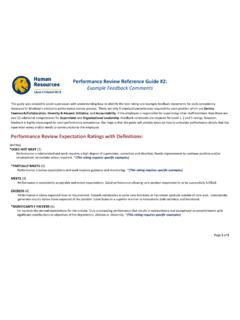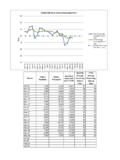Transcription of Intrinsic and Extrinsic Motivation - Princeton University
1 Review of Economic Studies (2003) 70, 489 520 0034-6527/03/00190489$ c 2003 The Review of Economic Studies Limited Intrinsic and Extrinsic Motivation ROLAND BE NABOU. Princeton University and Institute for Advanced Study and JEAN TIROLE. IDEI (Universite de Toulouse I), CERAS and MIT. First version received February 2000; final version accepted January 2003 (Eds.). A central tenet of economics is that individuals respond to incentives. For psychologists and sociologists, in contrast, rewards and punishments are often counterproductive, because they undermine Intrinsic Motivation . We reconcile these two views, showing how performance incentives offered by an informed principal (manager, teacher, parent) can adversely impact an agent's ( worker , child) perception of the task, or of his own abilities. Incentives are then only weak reinforcers in the short run, and negative reinforcers in the long run. We also study the effects of empowerment, help and excuses on Motivation , as well as situations of ego bashing reflecting a battle for dominance within a relationship.
2 Tom said to himself that it was not such a hollow world, after all. He had discovered a great law of human action, without knowing it namely, that in order to make a man or a boy covet a thing, it is only necessary to make the thing difficult to attain. If he had been a great and wise philosopher, like the writer of this book, he would now have comprehended that Work consists of whatever a body is obliged to do, and that Play consists of whatever a body is not obliged to do. Mark Twain, The Adventures of Tom Sawyer (1876, Chapter 2). INTRODUCTION. Should a child be rewarded for passing an exam, or paid to read a book? What impact do empowerment and monitoring have on employees' morale and productivity? Does receiving help boost or hurt self-esteem? Why do incentives work well in some contexts, but appear counterproductive in others? Why do people sometimes undermine the self-confidence of others on whose effort and initiative they depend?
3 These questions will be studied here from a unifying perspective, emphasizing the interplay between an individual's personal Motivation and his social environment. We shall thus model the interactions between an agent with imperfect self-knowledge and an informed principal who chooses an incentive structure, such as offering rewards and threatening punishments, delegating a task, or simply giving encouragement, praise, or criticism. It is a central theme of economics that incentives promote effort and performance , and there is a lot of evidence that they often do ( Gibbons (1997), Lazear (2000)). In other words, contingent rewards serve as positive reinforcers for the desired behaviour. In psychology, their effect is much more controversial. A long-standing paradigm clash has opposed proponents of the economic view to the dissonance theorists , who argue that rewards may actually impair performance , making them negative reinforcers , especially in the long run (see, Kruglanski (1978) for an account of this debate, and Deci, Koestner and Ryan (1999) for a recent and comprehensive meta-analysis of experimental results).
4 489. 490 REVIEW OF ECONOMIC STUDIES. Indeed, a substantial body of experimental and field evidence indicates that Extrinsic moti- vation (contingent rewards) can sometimes conflict with Intrinsic Motivation (the individual's desire to perform the task for its own sake). In a now classical experiment (see Deci, 1975), college students were either paid or not paid to work for a certain time on an interesting puzzle. Those in the no-reward condition played with the puzzle significantly more in a later unrewarded free-time period than paid subjects, and also reported a greater interest in the task. This experi- ment has since been replicated many times, with numerous variations in design ( Wilson, Hull and Johnson, 1981) and in types of subjects. For instance, similar effects were found for high- school students in tasks involving verbal skills (Kruglanski, Friedman and Zeevi, 1971), and for preschool children in activities involving drawing with new materials (Lepper, Greene and Nis- bett, 1973).
5 In daily life, parents are quite familiar with what we shall call the forbidden fruit . effect: powerful or salient constraints employed by adults to enforce the prohibition of some activity often decrease the child's subsequent internalization of the adults' Kohn (1993) surveys the results from a variety of programmes aimed at getting people to lose weight, stop smoking, or wear seat belts, either offering or not offering rewards. Consistently, individ- uals in reward treatments showed better compliance at the beginning, but worse compliance in the long run than those in the no-reward or untreated controls groups. Taken together, these many findings indicate a limited impact of rewards on engagement (current activity) and a negative one on re-engagement (persistence). A related body of work transposes these ideas from the educational setting to the workplace. In well-known contributions, Etzioni (1971) argues that workers find control of their behaviour via incentives alienating and dehumanizing , and Deci and Ryan (1985) devote a chapter of their book to a criticism of the use of performance -contingent rewards in the work And, without condemning contingent compensation, Baron and Kreps (1999, p.)
6 99) conclude that: There is no doubt that the benefits of [piece-rate systems or pay-for- performance incentive devices] can be considerably compromised when the systems undermine workers' Intrinsic Motivation . Kreps (1997) reports his uneasiness when teaching human resources management and discussing the impact of incentive devices in a way that is somewhat foreign to standard economic theory. And indeed, recent experimental evidence on the use of performance - contingent wages or fines confirms that explicit incentives sometimes result in worse compliance than incomplete labour contracts (Fehr and Falk (1999), Fehr and Schmidt (2000), Gneezy and Rustichini (2000a)). Relatedly, Gneezy and Rustichini (2000b) find that offering monetary incentives to subjects for answering questions taken from an IQ test strictly decreases their performance , unless the piece rate is raised to a high enough level. In the policy domain, Frey and Oberholzer-Gee (1997) surveyed citizens in Swiss cantons where the government was considering locating a nuclear waste repository; they found that the fraction supporting siting of the facility in their community fell by half when public compensation was offered.
7 Our aim here will be twofold. First, we want to analyse the hidden costs of rewards and punishments from an economic and cognitive perspective, rather than just posit an aversive impact on Motivation . Indeed, given that incentives work quite effectively in many instances, one needs to understand in what cases they should be used with caution. More generally, we seek to give a precise content to the loosely defined notions of Intrinsic and Extrinsic Motivation , and to clarify when, in the terminology of Frey (1997), the latter should be expected to crowd out . 1. See, Lepper and Greene (1978). Relatedly, Akerlof and Dickens (1982) suggest that imposing stiffer penalties for crimes might be counterproductive, if it undermines individuals' internal justification for obeying the law. 2. See also Lepper and Greene (1978), Kohn (1993) and Frey (1997). BE NABOU & TIROLE Intrinsic AND Extrinsic Motivation 491. or crowd in the former. This information-based, strategic analysis distinguishes our approach from Frey's reduced-form treatment of these issues.
8 We consider an individual (the agent, he ) who faces uncertainty about his payoff from taking a particular action. The unknown variable could be a characteristic of the person himself, such as raw ability, of the specific task at hand (long-run return, how difficult or enjoyable it is to complete, etc.), or of the match between the two. Naturally, the agent will undertake the task only if he has sufficient confidence in his own ability to succeed, and in the project's net return. As a result, people with a stake in his performance have strong incentives to manipulate signals relevant to his self-knowledge. Given that effort and ability are usually complements in the production of performance , they will want to boost his self-confidence, as well as his interest in the task. Thus, in much of this paper, a principal (parent, spouse, friend, teacher, boss, colleague, etc., she ) has a vested interest in (derives a benefit from) the agent's undertaking and succeeding in the activity.
9 In many circumstances, both parties have private information about the agent's suitability to the task. The agent usually has better knowledge of his previous performances and of the relevant circumstances (his effort intensity, the idiosyncratic factors that may have come into play). He will often also receive privately signals about the attractiveness or unpleasantness of the task, either from third parties (friends tell him that school is not fun, while cigarettes are cool), from having performed similar ones in the past, or simply from his own experience as he starts carrying out the current one. The principal, on the other hand, often has complementary private information about the task or the agent's prospects from it. For example, a teacher or manager is better able to judge the difficulty of the subject or assignment, which, together with the agent's ability, conditions the probability of success. The principal may know better than the agent whether the task is attractive, in terms of either being enjoyable to perform, or having a high payoff for the agent.
10 Last, while having less direct information about the agent's previous performances, she may be better trained at interpreting it due to her having performed the task herself, or having seen many others attempt it. As we shall discuss later on, the observation that others may have private information relevant to an individual's self-view underlies several fields of research in education and management. It is this type of private information that will be our In the first part of the paper we thus study the attributions made by an agent when a principal with private information makes a decision, such as selecting a reward, delegating a task or more simply encouraging the agent, that impacts the latter's willingness to perform the task. As was pointed out by Cooley (1902), the agent should then take the principal's perspective in order to learn about himself. The agent's attribution of ulterior Motivation to the principal, or, in economics parlance, his attempt to infer her private information from her decision, is what Cooley termed the looking-glass self.
